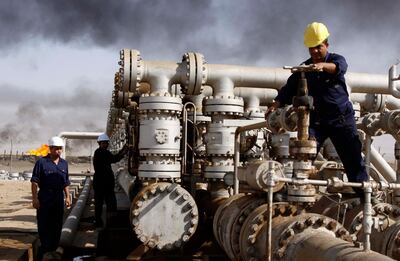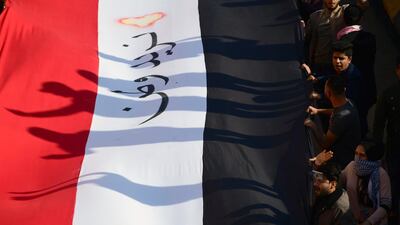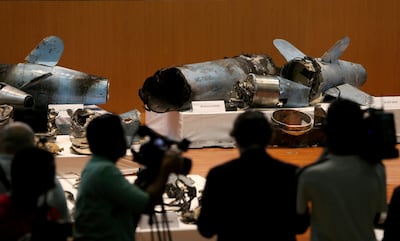Across the West, eyes were transfixed this last year on Hong Kong where, week after week, pro-democracy protesters took to the streets.
Although they received far less international coverage, the protests in Iraq are no less significant, demanding a change in the system of government and rejection of Iranian interference.
So far, more than 521 Iraqi protesters have been killed by sniper shots to the heart and gas canisters to the head fired by Iraqi security forces and pro-Iranian militias. About 21,000 have been wounded.
The outcome of this confrontation will have consequences not only for the Iraqi people, but also for the region.
The protests, now in their fourth month, have brought about the resignation of the prime minister, the passing by Parliament of a new election law, and the torching of Iranian consulates and buildings of pro-Iranian groups.
The contest between Iraq’s people and its politicians is likely to come to a head in 2020. And while the first round may have been won by the people, there is no guarantee that they will triumph in the end.
In the largest grassroots mobilisation since the overthrow of Saddam Hussein in 2003, young Iraqis have taken to the streets of Baghdad and southern cities to express their frustration at government corruption, poor public services, unemployment and Iranian interference.
The protesters were initially young men from the deprived Baghdad neighbourhood of Sadr City. However, following the violent response of the Iraqi government and Iranian-backed militias, they were joined by students, civil society groups and middle-class professionals.
Through the organisation of food, security, media, music and murals – and with the participation of women – the protesters are creating the sort of society they wish to live in, and building a new sense of citizenship and belonging from the bottom up.
The demonstrators are calling for not only a change of politicians, but also for the replacement of the political system which they hold responsible for keeping the country in a cycle of repression and insurgency.
Introduced by the US-led coalition, the post-2003 order was supposed to ensure pluralism but instead institutionalised sectarianism with positions allocated according to quotas, muhassassa.
The system evolved into a kleptocracy in which Iraq's political elites divide up the country's oil wealth between them, with ministries serving as fiefdoms to provide patronage to those connected to parties and militias. Large contracts are awarded to companies that are close to the politicians and fraud results in poor delivery of basic services.

With the economy not diversified and the private sector crowded out, between 7 million and 9 million Iraqis are estimated to be on the public sector payroll. More than half a million Iraqis enter the job market each year and have few prospects, no matter what their levels of education.
With ISIS defeated and security improved, the ruling political parties can no longer claim that the choice is either them or terrorists. Nor can politicians use sectarianism to mobilise support. The vast majority of the protesters are Shiite, and their symbols and hashtags – “I want my country back”, “Save the Iraqi people”, “You are all thieves” – are staunchly nationalist. It is the people versus the politicians.
The protesters have an important ally in Ayatollah Ali Al Sistani who serves as mediator between state and society, urging the government to respond to the demands of the protesters – and the protesters to remain in the squares and streets until reforms are implemented.
It was in response to Mr Al Sistani’s rebuke that Adel Abdul Mahdi tendered his resignation as prime minister.
Iraq’s President Barham Salih is a leading proponent of reforms and is refusing to nominate a new prime minister unless he is independent with no party affiliation, which is a key demand of the protesters.
This year, the Iraqi government will try to convince the protesters to end their demonstrations through promising reforms or through repression. And the protesters will continue to pressure the government to overhaul itself, rather than form a political movement to contest power in a system they believe is fundamentally flawed.
While the leaderless nature of the protests makes it difficult for the government to target ringleaders, it also means there are no legitimate representatives with whom to negotiate. And increased government repression is likely to push elements among the protesters to take up arms.
However, Iraq’s ruling political parties have little incentive to change a system from which they benefit. And the system is very difficult to reform as power is diffused among different centres, institutions are weak, corruption is rampant and the state does not have a monopoly on the use of force.
It is not only Shiite politicians who seek to keep the muhassassa system in place – Kurdish and Sunni legislators do too.
So does Iran. Maintaining control of Iraq through its influence over politicians and militias is seen as critical to the survival of the republic, providing the "lung" that alleviates the biting impact of sanctions and the corridors that enable the overland logistical supply to the Syrian regime and Hezbollah.
Reacting to Iranian aggression, Iraqi protesters chanted “Iran out, Iraq free,” and torched the Iranian consulates in Najaf and Karbala.
And many are asking, "Where is the United States?"
In 2020, the impact of the incoherence of America’s foreign policy in the region will be further evident.
Iran responded to US withdrawal from the nuclear deal with Tehran and President Donald Trump’s “maximum pressure” with attacks on shipping in the Gulf, strikes on Saudi Aramco's oil facilities in Abqaiq, shooting down a $160 million American drone, and expanding its nuclear programme.
Iran’s display of greatly improved capabilities left Gulf countries anxious about the reliability of the US as an ally when it failed to respond militarily to these provocations. The US approach may well achieve some outcomes that it wants – a sustainable ceasefire in Yemen as Saudi reaches a deal with the Houthis; and an end to the boycott of Qatar.
But it may also have the unintended consequence of pushing some regional leaders into a hedging strategy, with some Arab countries reaching a form of rapprochement with Iran to reduce tensions and avoid all-out war, rather than the isolation of Iran and reduction in its malign activities.
In Syria, it is Russia and Iran who will remain the most influential external players in charting the country’s path after the conflict, having assured the survival of the Assad regime. The US gave up its influence with the abandonment of its Kurdish allies.
In Libya, external competition is likely to intensify, with Russia increasing support to Field Marshal Khalifa Haftar (and thus strengthening its strategic position in the Mediterranean), and with Turkey responding positively to the request of the Libyan Government of National Accord for more military assistance. More refugees will risk their lives crossing the Mediterranean Sea to find sanctuary in Europe.
In the coming year, China will continue to steadily increase its influence in the Middle East, from which it now imports half of its energy needs. Beijing has already signed agreements with 21 countries in the region, including strategic partnerships with Egypt, Iran, Saudi Arabia and the UAE, offering to build infrastructure to bring prosperity as it extends its Belt and Road initiative.
As for Iraq, if those fearless citizens protesting for better governance do not succeed in pressuring the Iraqi government to reform, then among the dysfunction and disaffection the next iteration of ISIS will be able to recruit from youths who find employment and dignity in insurgency.
And so the cycle will continue.
Emma Sky is Director Yale World Fellows and a Senior Fellow at Yale University’s Jackson Institute. She is author of The Unravelling: High Hopes and Missed Opportunities in Iraq (2015) and In a Time of Monsters: Travelling in a Middle East in Revolt (2019)



